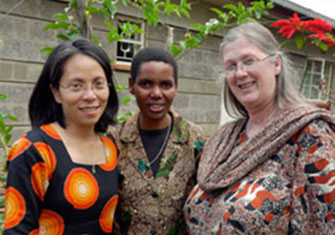Nonviolence and Just Peace: Let us start with ourselves
Maryknoll Sister Giang Nguyen wrote the following reflection on personal responsibility and connections to nonviolence for the Nonviolence and Just Peace conference in Rome in April.
Maryknoll Sister Giang Nguyen wrote the following reflection on personal responsibility and connections to nonviolence for the Nonviolence and Just Peace conference in Rome in April.
Where and how do you feel we need to invest our energy in nonviolence work as a church?
Let us start with ourselves – to look at ourselves and all the violence within us that is denied and suppressed. Denial and refusal to admit, accept and own our violent tendencies because of our privilege and rank force others with less privilege and rank to deal with our share of the burden.
For ten years I have lived in an intentionally diverse community, committed to doing my inner work which informs my life in community, contributing to our communal experience and allowing it to flow into my ministry. I have seen in my own life and in the people we work with the insidious, silent flow of violence that at times are overt and many times are silently killing the spirit of people.
Different fields of human endeavors are converging, pointing to the reality of an interdependence of all of life, in the material and non-material realm. We see this interdependence giving hope and courage to people sitting in small circles to give voice to the violence that goes on in their daily lives – from the killings they witness and for some participation in the conflict.
Our shared stories and listening to each other help all of us to not feel alone and give courage to each of us to go deeper into ourselves and say yes to that inner yearning for more life. These small groups that I participate in showed me how even a small group of people willing to go deeper into themselves and giving voice, receiving encouragement in a group starts ripple effects in our collective lives for a nonviolent way of living.
When I go home to the United States, I become aware that there are some of us who do not have to be aware that the pollution from all the conveniences in our lives do not effect our lives. Back to Kenya, I hear from people who have spent much of their savings on hybrid seeds, waiting for rain that came too late and then too hard – ruining the whole field.
The circle of interdependence breaks down when we are not willing to see our personal part in it. Does this not work the same with our own unvoiced, unseen, unaware thoughts and emotions that impact those around us? What happens when a person refuses to deal with their own personal violence? Where does that energy go?
After the post election violence in 2008 in Kenya, the reactions of participants from the upper middle class, living in affluent neighborhoods was to switch off the unpleasant news. This causes others to comment on the absence of the voice of those privileged people. They did not offer their voice to influence what was happening. They had the privilege to stay silent, to turn off the television when they have had enough. They were in a privilege position to not have to deal with their strong emotions. I do believe that their and my refusal to work on myself at this psychic level displace this psychic energy elsewhere and someone else will have to deal with this psychic energy.
We as a church can create safe spaces where people can come together, give voice to their life experiences – hard and hopeful – so that we can together heal our inner wounds and find strength to take personal responsibility for violence. Then we will not pollute our environment with our material or psychic waste and force the most vulnerable to bear the burden.
Photo: Maryknoll Sisters Giang Nguyen, Sia Temu and Teresa Hougnon (left to right) serve on the Maryknoll Sisters peace-building team in Africa. Since 2006, they have worked to facilitate relationships among culturally diverse people. They themselves are from diverse cultures and ethnic backgrounds. They believe in the African proverb “Peace is costly but it is worth the expense.” Together, they explore peaceful means of co-existence. Photo courtesy of the Maryknoll Sisters.

